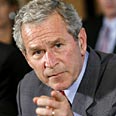
US President Bush
Photo: Reuters
Israel has never enjoyed such broad American support for both its policies and military actions as it does today. It began with an explicit presidential objection to international calls for an immediate cease fire that could disrupt the attaining of certain goals (with Bush's call in the background 'to do battle with an organization that initiated terror attacks and with the countries that support it'); all the way to the emergency shipment of "smart bombs" meant to help the effort that refuses to end.
It may be a comfortable feeling to have US backing, but we must be careful of this "honey trap." It's a strange paradox.
No treaty
Israel has always refused to sign a strategic agreement with the United States, for fear that such a treaty could inhibit Israel's freedom of action. But even though no such agreement exists, America has hinted at expectations that Israel act as an active partner in America's campaign against world-wide terror.
This could even stand in contrast to Israel's interests and bog Israel even further down than it is bogged down today: Lebanon continues to exact a heavy price every day, mainly amongst Israeli civilians but also from the IDF.
And – voila! – even senior IDF officials are signaling that they won't be able to finish the military conflict without a diplomatic arrangement. In other words, it would appear that a quick ceasefire and significant entry of an international force on the ground, could very well be in Israel's interest.
Danger ahead
But that's not all, and there is potentially great danger ahead: Scud and Shihab missiles, with their conventional and non-conventional warheads, cannot reach America's east coast. But they can reach every part of Israel. Do we really need to stand at the head of the sane world in the fight against the axis of evil?
True, this writer has recommended hitting Palestinian – Islamic headquarters in Damascus as this round of fighting began (and I continue to support that position), even if such a move would increase friction with the Syrians. But there is a great distance between that recommendation and clashing head-to-head with Damascus – and all the more so vis-à-vis Iran.
Suckers
Still, there has already been one positive result from the fighting in the north: The mask has been removed from Iran, and the "kid gloves" with regard to dealing with that country must change. Now is the time for action on the ground.
But it is critical to stress that this is not Israel's goal, and the United States must not turn its trusty ally in the Middle East into its proxy vis-à-vis Iran. When Secretary of State Condoleeza Rice arrives later this week, she must be told in no uncertain terms that Israel has got enough on its plate being the world's "suckers" in fighting Hizbullah. Israel fulfilled its responsibilities by pulling out of Lebanon to the international border, and the "payment" for the current fighting should not have come out of our pockets.
Now, that responsibility is on Lebanon's shoulders – and certainly on those of Syria and Iran, and on the entire world.
Practically, recent decisions of the G-8 are very important, but this framework could lead to a political obstacle course that will prevent any chance of reaching joint operative decisions. The sane nations, led by the United Nations, must authorize the United States to lead the way to an effective international diplomatic-economic-military campaign against Iran. The US must be allowed to choose its partners for this project (not including Israel).
Move slowly
In the military aspect, there is no need to hastily rush towards the target. We must have patience and must once again use the same strategy Washington has chosen in Iraq – to cut off the head of the dragon.
The Americans may have failed in their attempt to assassinate Saddam Hussein in the opening stage of the war, but at least they tried. Washington would be well advised to once again search calmly for the right moment, in light of Ahmadinejad's expected move to the defensive.
Hitting the Iranian leadership – the most dangerous in Tehran since Khomeini – would certainly influence that country's overall modus operandi. Leaders of the free world must initiate, take responsibility and solve the Iranian problem at the root for the sake of humanity. Otherwise we will once again, and very quickly, find that right around the corner – and we will be the first to pay the price.
Brig. Gen. (res.) Yossi Ben-Ari was a senior intelligence officer















